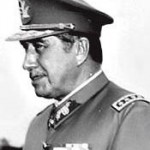Forty years ago today, on the 11th of September, 1973, General Augusto Pinochet mounted a successful coup in Chile. Deploying the military to remove democratically elected socialist President, Salvador Allende, Pinochet subsequently established himself as a dictator, a role he maintained until 1989.
The obvious reaction to Pinochet’s regime is one of disgust. Asides from being illegitimate from its inception, his government was frighteningly authoritarian. Parliament was shut down, trade unions and opposing political parties were banned, 30,000 people were exiled, thousands were tortured, and over 3,000 ‘disappearances’ were attributed to the regime. The arrogance of the regime even extended to banning certain traditional musical instruments. When Pinochet died in 2006, about 300 criminal charges were pending against him, including charges of human rights violations.
However, his legacy is a complex one. Economically, Pinochet leaned laissez-faire, and his years in power saw Chile transition from a planned economy to a free market.
Indeed, from an economic point of view, the end results of the Pinochet years were in many ways positive. Inflation fell from 375% in 1975 to 9.9% in 1982. Likewise, between 1985 and 1996 GDP growth per annum averaged what Gary Becker called “a remarkable 5%”, and reached 10% in 1989. It has averaged around 5% in more recent years. As of 2006, it has the highest GDP per capita in all of Latin America. In 2010 the Organization for Economic Cooperation and Development accepted Chile as a member in recognition of “nearly two decades of democratic reform and sound economic policies.”
This legacy is disputed somewhat. At no point was Pinochet completely supportive of a free market. The copper industry remained nationalised, for example, and the regime also nationalized banks. Some economic statistics remained poor; in 1987, around 40% of the population were below the poverty line. After the next 20 years, including 17 under civilian rule, that number had more than halved to 18.2%.
However, the successful parts of Chile’s economic reforms have provided the rationale for Pinochet apologists. Although the US was publicly critical of the coup, documents released in 2000 revealed that there was initially tacit private approval, and that the Central Intelligence Agency subsequently gave active assistance to the regime. Many of Pinochet’s officers were in fact paid by the CIA and US military.
Many free market intellectuals also gave a degree of support. Pinochet’s main economic advisers, the “Chicago Boys”, were a group of Chilean neo-liberal economists taught by Milton Friedman at the University of Chicago. Friedman himself met with Pinochet in 1975. Friedrich Hayek also visited multiple times in the 1970s and 1980s.
In their defence, most of these individuals were critical of the unsavoury parts of the Pinochet regime. Friedman, for example, was openly critical of the centralized military government, stating “Chile is not a politically free system and I do not condone the political system. But,” he continued, “the people there are freer than the people in communist societies because government plays a smaller role.” For these economists, the value of free markets seemed to outweigh the cost of authoritarianism in non-economic areas. Hayek has gone on record stating, “my personal preference leans toward a liberal dictatorship rather than toward a democratic government devoid of liberalism.”
For Friedman and the others, though, economic liberty was a means to general freedom as well as being an end in itself. To an extent, Chile’s experience supports this view. Pinochet accepted the results of a 1988 referendum which essentially gave him a no-confidence vote, and stepped down in 1990. Chile did become more democratic and did away with the more tyrannical parts of its state apparatus. Although hardly perfect, as demonstrated by extensive protests in 2011 and 2012, Chile’s institutions are now relatively democratic by world standards.
It should not be forgotten, however, that this did not happen over night. It took almost twenty years of brutal authoritarian rule before democracy emerged. Although freeing the market eventually freed the people, it did not do so anywhere near fast enough. The years of oppression and suffering can not be seen as a justified means to the end of eventual liberty, especially as democracy had existed for almost 50 years in Chile before the coup.
It is true that a free market is fundamentally linked to liberty. Where you cannot exercise the right to choose what to buy and sell, you are not truly free. Further, a laissez-faire economy can breed attitudes of individualism and independence.
However, free markets are a necessary but not sufficient basis for liberty. They do not make up for, or justify, the loss of other liberties. The mistake of apologising for a Pinochet should never be made again.
Image credit to en.wikipedia.org.
